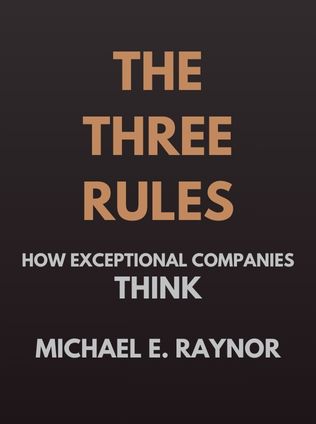
The Three Rules
How Exceptional Companies Think
By Michael E. Raynor
Published 05/2013
About the Author
Michael E. Raynor is a distinguished director at Deloitte Services LP, where he specializes in corporate strategy, innovation, and growth. Raynor has co-authored several influential books, including The Innovator's Solution with Clayton Christensen, which explores how companies can systematically approach innovation. His work, which often focuses on the long-term sustainability of business strategies, has received critical acclaim for its depth and practical applicability.
Mumtaz Ahmed serves as a principal in Deloitte Consulting LLP and holds the position of chief strategy officer at Deloitte LLP. He is responsible for the firm's overall strategy, corporate development, innovation initiatives, and brand management. Ahmed's extensive experience in these areas provides a strong foundation for his co-authored work with Raynor. Together, they have crafted a book that combines rigorous research with actionable insights, aimed at helping companies achieve exceptional performance.
Main Idea
The Three Rules: How Exceptional Companies Think by Michael E. Raynor and Mumtaz Ahmed provides a comprehensive framework for understanding what sets truly exceptional companies apart from their competitors. The authors distill decades of research and data analysis into three core principles that successful companies follow:
- Better before cheaper: Exceptional companies focus on providing superior value beyond just price. They prioritize quality, innovation, and unique features over competing on cost alone.
- Revenue before cost: Rather than cutting costs, these companies focus on increasing revenue. They achieve this by enhancing the customer experience, improving products, and expanding market reach.
- There are no other rules: This final rule emphasizes the flexibility required in strategy. While the first two rules are paramount, everything else is adaptable based on the company's specific context and challenges.
Table of Contents
- Introduction: The Quest for Exceptional Performance
- Better Before Cheaper
- Revenue Before Cost
- There Are No Other Rules
- Case Studies: The Miracle Workers
- Applying the Three Rules
- Conclusion: Sustaining Exceptional Performance
Introduction: The Quest for Exceptional Performance
The journey to discover what makes some companies stand out in the long term begins with the recognition that traditional business wisdom often falls short. Raynor and Ahmed's investigation into 45 years of data on over 25,000 companies reveals that exceptional performance is not merely the result of luck or isolated, unrepeatable events. Instead, it is driven by a set of identifiable and actionable principles.
"The study of great companies does not lead naturally to great insight. Inquiries into the ebb and flow of top performers yield, as often as not, explanations built on the concatenation of unlikely and impossible-to-repeat events." — Michael E. Raynor
This realization led the authors to focus on companies that consistently outperformed their peers, identifying two categories: 'Miracle Workers,' the best of the best, and 'Long Runners,' companies that maintained exceptional performance over an extended period. The analysis of these companies uncovered the three rules that are consistently followed by the most successful firms.
Better Before Cheaper
In the competitive landscape, companies often face a choice: to compete on price or to compete on non-price dimensions such as quality, innovation, and customer experience. Raynor and Ahmed argue that the most successful companies prioritize being 'better' over being 'cheaper.' This principle is encapsulated in the rule "better before cheaper."
Sign up for FREE and get access to 1,400+ books summaries.
You May Also Like
Rich Dad Poor Dad
What the Rich Teach Their Kids About Money - That the Poor and Middle Class Do Not!
By Robert T. KiyosakiFreakonomics
A Rogue Economist Explores the Hidden Side of Everything
By Steven D. Levitt and Stephen J. DubnerThe Lean Startup
How Today's Entrepreneurs Use Continuous Innovation to Create Radically Successful Businesses
By Eric RiesWho Moved My Cheese?
An Amazing Way to Deal with Change in Your Work and in Your Life
By Spencer Johnson, M.D.Factfulness
Ten Reasons We're Wrong About the World – and Why Things Are Better Than You Think
By Hans RoslingMake Your Bed
Little Things That Can Change Your Life...And Maybe the World
By William H. McRaven



















